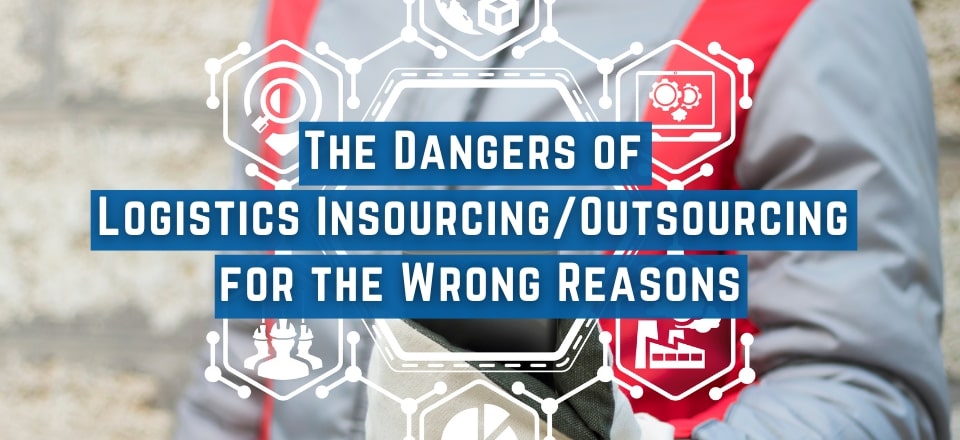If you follow our blog, you’ll know that we often post articles about logistics outsourcing. We’ve outlined the pros and cons, discussed the steps in the outsourcing process, looked at mistakes contributing to outsourcing failure, and offered guidance to avoid those errors.
In this article, we will revisit the logistics outsourcing topic by looking at the various reasons companies fall back on to justify a decision to outsource logistics or keep it in-house.
To keep things stimulating and different, however, we’ll focus only on scenarios where the chosen reason may not be the right one.
Why Do Companies Insource/Outsource for the Wrong Reasons?
Before we get more deeply into this topic, it’s worth taking a moment to consider the reason for choosing the wrong reasons for outsourcing decisions. However, as that’s a bit of a mouthful, we’ll try to articulate it a little more clearly.
Very often, the outsourcing decision is a binary one. For example, it either makes sense to outsource logistics activity to a 3PL, or it makes more sense to keep it in-house.
In our extensive experience of helping companies deal with outsourcing, correct mistakes, improve relationships with their 3PLs, and even make the critical insourcing vs. outsourcing decision, we’ve seen many instances where the decision to outsource or not was misguided due to unsound reasoning.
Decide in Haste, Repent at Leisure
In most cases, the mistake happens because decision-makers fail to thoroughly examine the pros and cons of outsourcing using their organisations’ unique circumstances for context. Instead, they fixate on one or two primary drivers that seem, on the face of it, to make the decision an obvious one.
It may be months—or even years—after acting on the decision that the flawed reasoning becomes apparent. By then, remediation could be highly disruptive—not to mention expensive.
It is this type of error in judgment, and the potential outcomes, that we’ll focus on in the remainder of this article.
Lack of Logistics Expertise: Not Always a Sound Outsourcing Justification
Let’s begin with one motivation for logistics outsourcing, which, in some circumstances, might be justifiable, typically when combined with other reasons.
Indeed, the same typically applies to most of the reasons for insourcing or outsourcing we will encounter in this brief overview. It’s when decision-makers place too much emphasis on any one motivating factor that problems tend to arise.
For example, it’s undoubtedly true that 3PLs, existing as they do solely to provide logistics services for other companies and organisations, are staffed predominantly by consummate professionals in the transportation, warehousing, and supply chain management sphere.
It’s also true that if your company does not engage in logistics as a core activity and you rely on it only to secure your supply chain, investment in logistics expertise might not be a primary fiscal goal.
However, if you’re thinking of outsourcing logistics to avoid the need to develop and maintain expertise internally, there’s one important reality to remember.
It Takes Logistics Expertise to Manage a Logistics Partnership
Even if you outsource your logistics activity, you will still require internal resources to manage the relationship between your company and its chosen logistics partner(s).
For larger organisations, in particular, a logistics function of some nature will need to exist, since it would be folly to allow a 3PL partnership to be dominated by the service provider.
Such an imbalance is ever a risk when a client of a 3PL maintains no stakeholders that speak the language of logistics and understand the mechanics of the relationship between client and service provider.
If logistics is not a core competency for your company, by all means, consider that as motivation for outsourcing. But don’t be misled into believing that with logistics contracted out to 3PLs, you can wholly abrogate the need for related expertise within your internal human resources structure. To do so will likely lead to problems at some point, such as when crises arise relating to logistics service and cost.
When Cost is Not an Appropriate Reason to Insource or Outsource
We often hear from our clients that cost was a primary factor in a decision to contract logistics out or keep it in-house. Again, it’s a reasonable justification when considered with other pros and cons relating to the decision. However, it can also become an overriding obsession, leading to a decision based too much on perceived cost benefits.
For example, outsourcing can seem like a potential cure for obfuscated logistics costs, given that lack of cost transparency is a common issue for organisations that manage logistics internally.
In the face of such a challenge, the ability to differentiate logistics expenses from other operational costs is an attractive prospect—and one seemingly achievable by paying a partner to manage logistics activity.
However, the truth is that seeking cost visibility through logistics outsourcing is a risky gambit. After all, how can you predict the financial impact of outsourcing if you don’t know the costs of operating your supply chain before you contract your logistics activity to a 3PL? To coin a quaint saying, outsourcing for cost visibility is putting the cart before the horse.
Know Your True Logistics Costs Before You Decide
To ensure that any logistics outsourcing venture is successful, you must accurately analyze current logistics costs before you begin courting potential service providers. Committing to a long-term outsourcing relationship is a rather drastic and expensive solution to cost-visibility issues and would probably carry no guarantee of success.
Several less costly methods are available to achieve cost transparency, such as cost-to-serve analyses, which you can conduct internally or, if necessary, with help from a logistics consulting partner.
After establishing your logistics costs, you can use the information to make the right outsourcing decision. Aside from increasing the chances of a successful 3PL relationship, you will also achieve clarity as to the financial impact of outsourcing.
Don’t Make Assumptions About Outsourcing’s Impact on Costs
It’s fair to say that there are at least three possible mistakes to avoid here:
1) An unfounded belief that outsourcing will reduce logistics costs. In many cases, it doesn’t. To be sure, you need to have a definitive picture of your current logistics costs, against which you can benchmark the projected costs of working with prospective 3PL partners.
2) An unverified assumption that outsourcing will increase logistics costs compared to those of an in-house operation. This mistake commonly occurs when an organisation doesn’t fully understand its existing logistics costs. It is possible to save money through outsourcing. Whether you manage to do so will depend on the cost-efficiency of your current logistics operation and your understanding of the same.
3) Making either of the above assumptions without knowledge of existing logistics costs. As already mentioned, if you don’t have an accurate view of current expenditure, you can’t know if outsourcing will save money or increase your operating costs.
There’s no question that the cost impact of an outsourcing decision is one of the most critical considerations. Nevertheless, it’s vital to avoid assumptions. The best way to do that is by completing a thorough analysis of current actual costs versus the projected costs associated with commencing—or ending—a 3PL partnership.
Eliminating Inherent Logistics Issues: Why Outsourcing Might Not Succeed
Some organisations, desperate to solve long-standing problems in their logistics network or processes, might conclude that a third-party logistics partner can help them to end their frustrations. That may be true if the organisation is prepared to see its logistics operation overhauled and accept that things will be done differently.
However, in many cases, a 3PL will not readily agree to re-engineer a client’s logistics strategies, tactics, and methodologies. Typically, a logistics partner will expect the client to call the tune and will elect to follow whatever approach the client desires, simply providing the assets, expertise, and resources required.
As a result, it’s not unusual for inherent problems and issues in the supply chain to be merely transferred rather than eliminated.
Before You Outsource Logistics, Plan for Improvement
If the perception that a 3PL partner will solve incumbent challenges is the sole foundation of an outsourcing decision, frustration, far from being lessened, might be further exacerbated over time.
When issues go unresolved, the partnership can quickly descend into finger-pointing and disputes about who is to blame for shortfalls in customer service and unrealised cost benefits.
In the end then, much as you should always understand your logistics costs before making outsourcing decisions, so you should have concrete plans to resolve problems and issues in your logistics operation. That will reduce risk by enabling you to discuss with prospective partners how they might work with you to implement those plans.
How Logistics Consultants Can Help With Outsourcing and Improvement Plans
So do you think you need help identifying and planning fixes for logistics issues? If so, it can be a good idea to seek aid from a management consulting firm specialising in that field.
For example, here at Logistics Bureau, we help clients to isolate the causes of logistics problems, identify the most appropriate solutions, and assist with implementation.
Furthermore, if we determine that outsourcing can help, or our client wishes to contract logistics to a 3PL, we’re always ready to assist with the logistics outsourcing process. Our outsourcing services include provider selection, contract development, negotiation, and relationship management.
Don’t Outsource with Resource Reduction as a Sole Goal
So if you shouldn’t outsource solely to eliminate logistics problems, gain cost transparency, or compensate for a dearth of related internal expertise, how about using it as a path to headcount or asset reduction?
Unfortunately, the same principle applies to this scenario as to the other inappropriate outsourcing justifications discussed so far. Fixation on logistics outsourcing as a way to impress investors by reducing capital investments, or to reduce the number of employees on the books, might be followed by the eventual discovery that these benefits are offset by drawbacks elsewhere.
The reduced asset and resource burden may be negatively offset by issues such as a loss of service quality or supply chain agility, increased operational costs, or other matters which might have been more easily avoided with insourced logistics.
Again, this is not to say that resource or asset reduction can’t be benefits gained through logistics outsourcing. However, it’s not a good idea to consider them as such in isolation from all the other factors that make outsourced operations suitable for some companies but not for others.
What About Insourcing for All the Wrong Reasons?
It’s time to introduce a little balance to this discussion, perhaps, because while some companies might lean too much on a single justification for outsourcing, others spurn the idea for reasons that can be just as inappropriate. By doing so, they may miss out on potentially vast opportunities for business improvement.
We’ve already covered the drawing of assumptions about insourcing/outsourcing cost impacts, and why you should know your costs before you make a decision, so let’s turn our attention to three other examples of flawed reasoning for keeping logistics in-house.
1) Insourcing is Best for Customer Service
The above assertion is one that often drives enterprises to shy away from the idea of contracting logistics to a 3PL. It’s easy to assume that no external service provider will value your company’s customer service ideals sufficiently or care enough about the service it provides in your name.
Easy it may be, but many times it will be an incorrect assumption. There is no reason why outsourcing should compromise service quality or customer satisfaction, if:
- The outsourcing project is managed effectively
- Sufficient due diligence is exercised in partner selection
- Service expectations are clearly and assertively set out during contract development
Indeed, with the right partner and effective contract management, the specialised approach, industry expertise, and dedicated technology that a 3PL partner brings to your logistics operation could considerably improve your customer service levels.
2) No External Partner Could Perform as Well as an In-House Operation
This second reason is not the same as believing that customer service will suffer if you outsource your logistics, although it often goes hand in hand with that concern.
Essentially, though, we are talking about a broader concern founded on the perception that no logistics provider could deliver the equivalent service, at a similar cost, with the same efficiency, and with the prescribed approach that you feel represents your enterprise in the best possible way.
In essence, you feel that only by retaining an insourced logistics operation can your business be its best self. But a decision to rule out the idea of outsourced logistics on this basis may be regrettable.
However specialised or unique your company’s product(s) may be, there’s almost certainly a 3PL prepared to tailor logistics processes expressly to your needs and those of your customers.
Furthermore, because 3PLs exist only to execute order processing, storage, and transportation for companies like yours, you can expect performance and service to exceed the levels you can reasonably achieve through an insourced operation. That’s provided, of course, that management of the 3PL/client relationship and of the logistics operation overall, is effective.
3) Fear of Conceding Logistics Control to an External Entity
Loss of control is perhaps one of the most pervasive and penetrating sources of fear for humans as individuals and hence, for organisational leaders. The fear that outsourced logistics means ceding control stops many companies from exploring the option.
It’s a logical point of concern, and if the transition from insourced to outsourced logistics is not managed appropriately and diligently, it might also prove justified. But on the other hand, the antidote to fear lies in a thorough and robust approach to developing and structuring the 3PL service agreement.
Most 3PL providers are highly customer-focused and, therefore, not averse to agreements tying them to rigorous reporting obligations and quality management processes. Therefore, a well-managed outsourcing venture can potentially yield an increase, rather than a loss of, control over a logistics operation.
Insource or Outsource: How to Choose the Right Reasons
You’d be right to think that it’s all very well to flag the insourcing/outsourcing motivations discussed in this article as being wrong but to doubt if that’s always the case.
To spare you from that quandary, we can tell you with conviction that it’s not always the case. Indeed, sometimes a reason we have covered here will prove entirely correct and justifiable.
The takeaway we want to highlight more than anything is that an outsourcing decision solely based on any of the reasons listed in this article, particularly if it is arrived at via unqualified assumption, can easily lead your strategy in the wrong direction.
My rationale for highlighting these reasons is that they are the ones that, in my experience, are most commonly cited as a sole or primary justification for a decision to outsource (or not to outsource) and later turn out to be a source of regret.
Apply a Process to Your Reasoning
So how do you avoid making the mistake of outsourcing (or insourcing) for the wrong reasons?
First, we recommend that instead of grasping at one or two reasons to justify an outsourcing decision, you make a comprehensive list of ALL the logistics outsourcing pros and cons that you believe apply to your organisation.
The next step should be to examine why each of those points on your list is a pro or a con and then highlight the ones you don’t have any verifiable data or evidence to support. These assumptions should then be tested before you either uphold or discard them.
As onerous a process as that may sound, it is the only way to ensure that you are accurate in your assessment of logistics outsourcing as a potential solution for your company.
Solid Reasoning Informs Sound Decisions
The absence of a thorough process for decision-making will only encourage the tendency to latch onto what seems like a compelling reason to outsource or not and fixate on it to the point where it drives, rather than informs, your decision.
The result might be one that you and your team wish had not come to fruition—and if that decision was to outsource—to spend a lot of time and expense correcting.
Gathering all data and information relevant to your potential motivators for or against outsourcing is the surest way to make your decision for all the right reasons. It can also pay to engage the help of a consulting firm like Logistics Bureau. After all, our track record of aiding companies to make successful logistics outsourcing decisions stretches back several decades, so we know a thing or two about it.
Why not visit our logistics outsourcing service page to learn more about how we can help? Alternatively, if you’d rather talk to a consultant right away, schedule a free initial advisory call using our quick and easy online booking form.
Editor’s Note: The content of this post was originally published on Logistics Bureau’s website dated September 20, 2022, under the title “Insourcing or Outsourcing Logistics: Don’t Choose the Wrong Reasons“.













